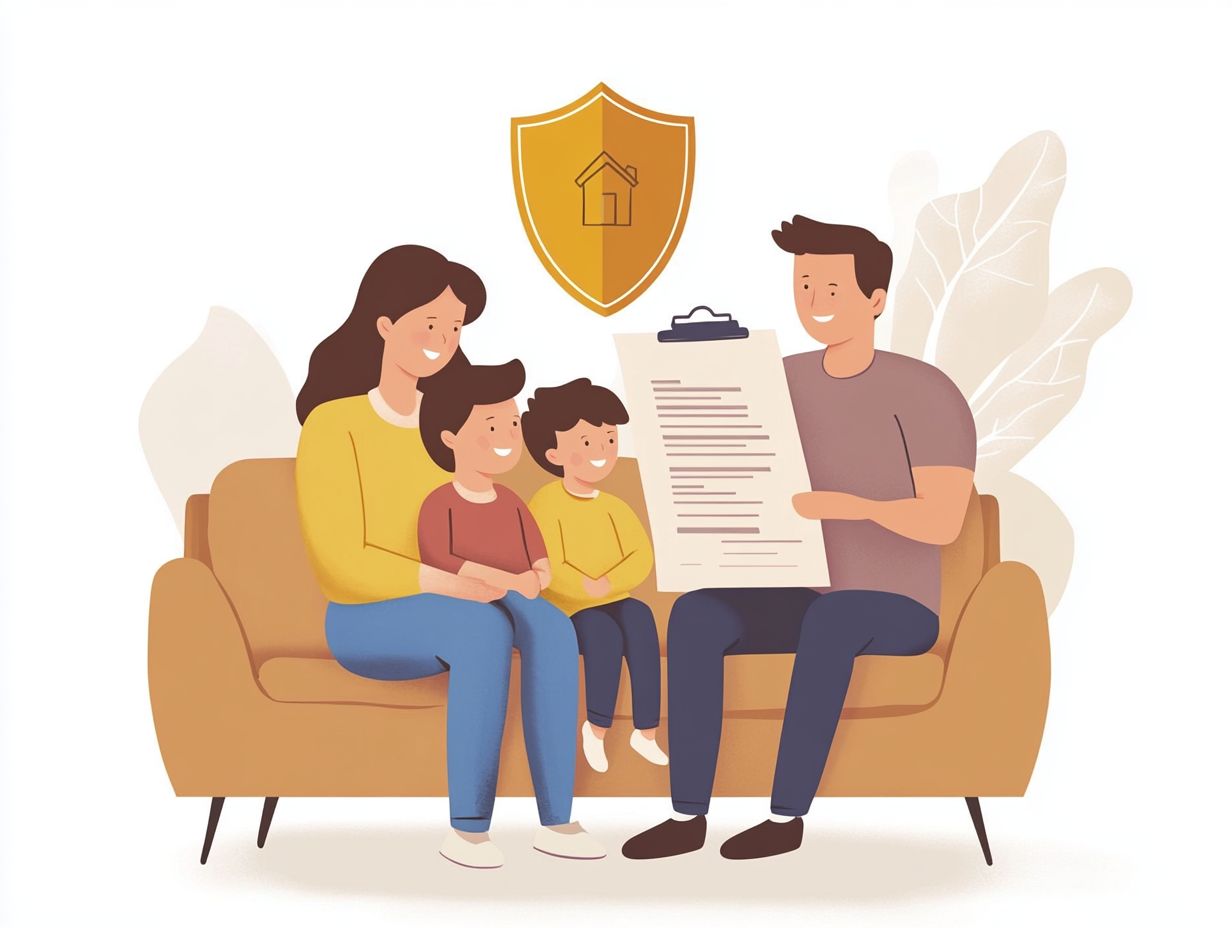What Does Home Insurance Cover?
Home insurance serves as a vital safeguard for homeowners, offering financial protection against unforeseen events that can disrupt your life.
Whether you re stepping into homeownership for the first time or reassessing your existing policy, understanding what home insurance entails is essential.
This article explores standard coverage options, including property damage and personal liability, and optional add-ons like flood and earthquake insurance.
It also examines the factors that influence your coverage, equipping you with the knowledge necessary to make informed decisions about protecting your home.
Contents
Key Takeaways:

- Home insurance covers property damage, personal liability, and additional living expenses in the event of unforeseen circumstances.
- Optional coverage, such as flood and earthquake insurance, can provide extra protection for your home and personal belongings.
- Factors like location, type of home, and personal risk assessment can impact your coverage and costs.
Understanding Home Insurance Coverage
Understanding home insurance coverage is important for homeowners. It includes key elements such as dwelling coverage, personal property protection, and liability coverage. Each is critical for safeguarding your investment against potential risks and natural disasters.
Home insurance policies can vary significantly by provider and often include additional protections. Be sure to check for any exclusions in your policy to avoid surprises when you file a claim.
Engaging with your mortgage lender can clarify coverage limits, ensuring your home is adequately protected and your peace of mind is intact.
What is Home Insurance?
Home insurance, often referred to as homeowners insurance, is a policy designed to protect your home and personal belongings from various risks, including theft, fire, and natural disasters. If you’re wondering, will home insurance cover theft? This essential coverage not only protects the structure of your dwelling but also extends to your personal property, liability costs, and living expenses if significant damage occurs.
You ll find various coverage options, including dwelling coverage, personal property coverage, and liability protection. Each is tailored to address your unique needs and risks.
It s important to choose an insurance policy that aligns with your individual needs. This ensures that your policy accurately reflects the value of your home and possessions, providing peace of mind in situations that could lead to financial upheaval.
Standard Coverage of Home Insurance
Standard home insurance provides essential protections crucial for your peace of mind. It typically includes dwelling coverage, which safeguards your home’s structure, and liability coverage to protect you from claims related to injuries on your property.
You’ll also find personal property coverage designed to protect your valuables. Additionally, home insurance often includes loss of use coverage, ensuring you receive financial support if your home becomes uninhabitable due to a covered event.
Don t forget medical payments coverage, which takes care of minor injuries that might occur on your premises.
Property Damage
Property damage coverage serves as your safety net, protecting both your dwelling and personal belongings from unexpected events like fire, flood, and earthquake damage. This coverage is categorized into dwelling coverage and personal property coverage.
With this protection, you can rest easy knowing that if disaster strikes, you’ll receive compensation to repair your home or replace lost items providing much-needed peace of mind during turbulent times.
For example, if a fire devastates your kitchen, this coverage will help pay for repairs. It’s crucial to understand the difference between actual cash value and replacement cost.
Actual cash value considers depreciation. For instance, if a five-year-old appliance is destroyed, the payout will be based on its reduced value not the cost of a new one.
Replacement cost coverage gives you the funds to replace the item with a new equivalent, covering the full cost of restoring your home and belongings without accounting for depreciation.
Now is the perfect time to review your coverage and ensure you re fully protected!
Personal Liability

Personal liability coverage is essential. It protects you financially if someone gets injured on your property and files a claim.
This coverage often pairs with medical payments coverage, which handles immediate medical expenses. It can be a lifesaver in situations like slip-and-fall incidents or dog bites.
Be aware of common exclusions, such as intentional harm or injuries to people living in your home. Knowing these details is vital for your protection.
Additional Living Expenses
This coverage helps you with costs when your home is uninhabitable due to a covered event. It provides relief for temporary housing and other necessities.
It s crucial during crises like natural disasters, fires, or severe water damage. Finding alternative accommodations can quickly become financially burdensome.
Covered costs typically include:
- Hotel stays
- Restaurant meals
- Any extra expenses from your displacement
If a fire makes your home unlivable, the policy might reimburse you for the difference in living expenses compared to your usual costs. Remember, there are coverage limits often defined by time or dollar amount.
Optional Coverage for Home Insurance
Optional coverage can elevate your homeowners insurance policy. It provides added protections like flood and earthquake insurance, which are often missing from standard options.
You can also add specialized coverage tailored to your unique needs. This ensures you re comprehensively protected.
Flood Insurance
If you live in a flood-prone area, flood insurance is essential. Standard policies often exclude flood-related damages, making separate coverage necessary.
Many homeowners are unaware that typical policies don t cover damages from rising waters. This can lead to devastating losses if a flood occurs.
By opting for flood insurance, you secure protection for your home and belongings. This gives you peace of mind and financial security.
Relying only on standard coverage could expose you to significant out-of-pocket expenses in the event of flood damage. This highlights the importance of specialized protection in your insurance strategy.
Earthquake Insurance
If you live in an area prone to earthquakes, this insurance is crucial. Standard homeowners insurance often overlooks this coverage.
With the rising frequency of seismic events, having earthquake insurance is vital. Standard policies usually don’t cover the extensive damage earthquakes can cause.
Think of earthquake insurance as your safety net for managing the aftermath of tremors and aftershocks. Remember that these policies may have specific exclusions.
For instance, damage from flooding or landslides following an earthquake might not be covered. Understanding these nuances helps you make informed decisions about your insurance coverage.
Personal Property Coverage

Personal property coverage in homeowners insurance protects your belongings, from furniture to electronics, against risks like theft, fire, and vandalism. If you’re interested in understanding more about this coverage, check out what home insurance is.
Each policy has specific coverage limits that determine how much you can claim. Navigating the details of this coverage is crucial to ensure that all your personal items from everyday clothing to prized collectibles are sufficiently protected.
Don t wait! Start an inventory of your belongings today to ensure you’re fully protected. Regularly reassessing the current value of your possessions can directly impact any claims you might need to make in unfortunate situations.
Be aware that there may be limits on certain categories, especially for high-value items, which could require special endorsements (extra coverage for specific items).
Consider the differences between replacement cost and actual cash value; this choice can significantly influence the payout you’ll receive in the event of a loss.
Factors that Affect Home Insurance Coverage
Several factors can greatly influence your home insurance coverage:
- Location and type of your home
- Your previous insurance history
- Any claims you’ve made
Insurance companies carefully look at these elements when determining the premium and coverage limits for your policy.
Location and Type of Home
The location and type of your home are essential in determining your homeowners insurance premiums. Insurance companies assess the risk tied to specific geographical areas, considering aspects like vulnerability to natural disasters and local crime rates.
For instance, if your home is in a coastal region, you might face higher premiums due to the increased risk of hurricanes and flooding. Conversely, properties in urban areas often see increased costs associated with higher crime rates.
Neighborhood characteristics such as the proximity of fire departments and the quality of local building codes can further influence your rates. Insurers also consider the type of dwelling; for example, condominiums may have different coverage needs compared to single-family homes.
All these factors create a comprehensive picture that dictates the insurance costs you ll encounter as a homeowner.
Insurance History and Claims
Your insurance history and previous claims are crucial in shaping both the cost and availability of your homeowners insurance. Insurers evaluate this information to assess your risk profile and determine your premium rates.
As you explore potential policies, understand that a history filled with frequent claims could label you as higher risk. This classification typically leads to increased premiums and fewer coverage options.
Insurers pay close attention to the specific types of claims you ve filed, especially those related to weather damage or liability issues, which can raise concerns about future risks.
Homeowners with a clean insurance record often enjoy lower rates and more favorable coverage conditions. Therefore, it s essential for you to manage your property proactively and prevent damage to uphold a positive insurance history. Doing so can help secure the best possible rates and terms for your policies.
Personal Factors and Risk Assessment
Personal factors like your credit score, age, and prior insurance experience can significantly influence the risk assessment process for homeowners insurance, impacting your coverage options and premium rates.
These elements reflect your financial responsibility and stability, providing insights into the likelihood of filing a claim. For example, a higher credit score often indicates reliability, making it less likely for you to encounter losses, which can translate to lower premiums.
In contrast, younger homeowners may be evaluated differently due to limited property management experience. Insurers might also consider your previous claims history, further shaping your coverage terms and pricing.
By understanding these factors, you can navigate your options with greater confidence and insight.
Frequently Asked Questions

What is personal property coverage?
Personal property coverage protects your belongings against risks like theft, fire, and vandalism. It s essential to know the specific limits and conditions of your policy.
How can I lower my home insurance premium?
Consider improving your credit score, bundling policies, increasing your deductible, and maintaining a clean claims history to potentially lower your premium.
What should I do if I need to file a claim?
Document the loss with photos and receipts, contact your insurance agent, and follow the claims process as outlined in your policy. Prompt action can help ensure a smoother claims experience.
Learn how you can save on your homeowners insurance today!
What Does Home Insurance Cover?
Home insurance protects your home and personal belongings from various risks and damages. To better understand your policy, it’s important to know what home insurance covers. Specific coverage can vary by provider, but generally includes:
Does Home Insurance Cover Natural Disasters?
Most policies cover damage from natural disasters like tornadoes, hurricanes, and earthquakes. Be sure to check your policy for adequate coverage for these events.
What Types of Damages Are Typically Covered?
Home insurance often covers damages from fire, theft, vandalism, and severe weather. To better understand what is included, it’s helpful to explore the types of home insurance coverage. It also protects your belongings, such as furniture and electronics, and includes liability coverage for injuries on your property.
Will Home Insurance Cover My Personal Belongings?
Yes, it typically covers your personal items like furniture, clothing, and electronics from damage or theft. However, check for limits and consider extra coverage for high-value items.
Does Home Insurance Cover Unoccupied Homes?
Most policies have rules that limit coverage for homes left unoccupied for long periods. Notify your insurer if you plan to leave your home empty and discuss your options.
What Is Not Covered by Home Insurance?
Home insurance usually does not cover damages from floods or earthquakes. You can buy separate policies for these risks, so it’s important to know what to look for in home insurance coverage. It also does not cover wear and tear or neglect.






